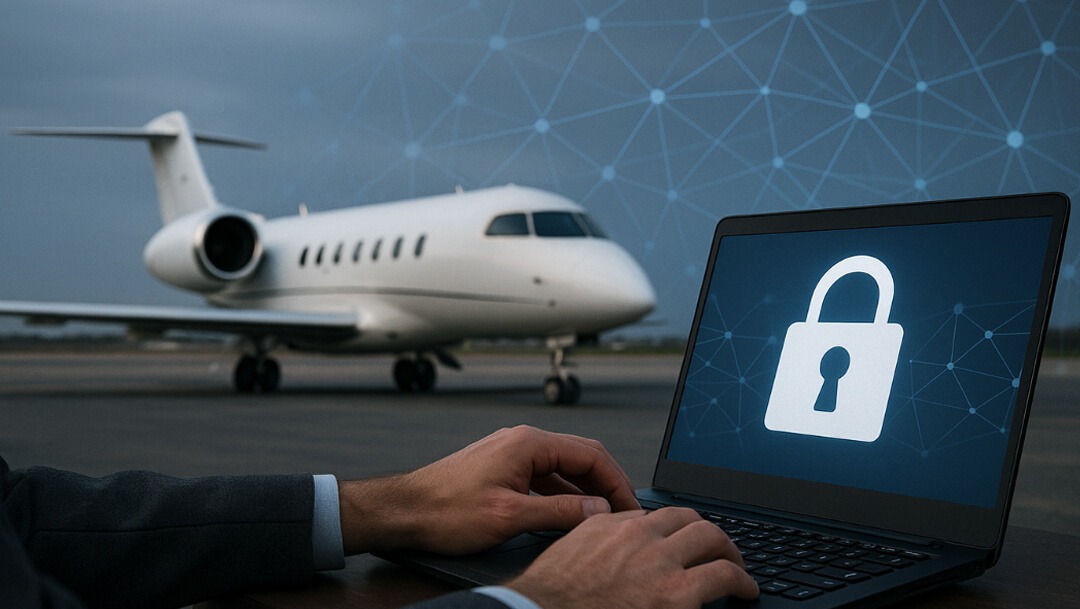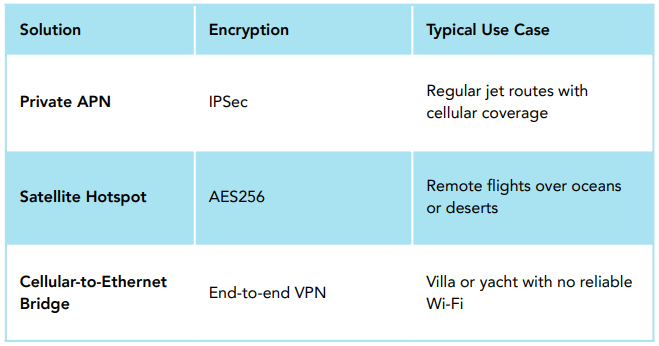
You’re strapped into your Gulfstream, passports, and smartphones in hand, bound for Cabo San Lucas—your personal sanctuary. The sea breeze and tequila sunsets are calling, and you’ve earned this escape. But as the sun dips below the horizon at 35,000 feet, opportunists see your moment of ease as an opening.
Travel introduces a special set of cyber risks for family offices. The very devices you rely on to manage investment portfolios and protect your second homes can become liabilities in flight or at a beachfront villa. In this post, we’ll map the travel cybersecurity threat landscape, explain how to lock down connections with secure mobile networks and VIP privacy tools, and share proven cybersecurity practices for family offices—even when you’re trying to get away from it all.
Cyber Risks During Travel: What Family Offices Face at 35,000 Feet
According to a Campden Wealth study, only 38 percent of family offices maintain a formal security plan—and yet 28 percent have experienced a breach. Security Magazine reports nearly 20 percent of travelers suffer cybercrime abroad, from credential theft to spyware. In other words, cyber risks during travel aren’t hypothetical . . . they’re happening midflight.
Key inflight threats include:
- Spoofed lounges that mimic airport Wi-Fi and harvest credentials
- SIM-swap scams targeting executives the moment they land
- Phantom base-stations that intercept roaming data
Unlike one-size-fits-all checklists, Decypher builds bespoke travelhardening playbooks for each family office—mapping every device and route before you even book your flight.
Secure Mobile Networks In-Flight: Locking Down Your Private Jet
Choose the right solution
- Private APN (IPSec)—leverages cellular providers for routine jet routes
- Satellite hotspot (AES256)—covers remote flights over oceans
- Cellular-to-Ethernet bridge (end-to-end VPN)—powers villas or yachts without reliable Wi-Fi

Pre-takeoff checklist:
- Disable automatic Wi-Fi and Bluetooth tethering
- Update firmware and install a hardware-level firewall app
- Verify each device’s VPN is set to auto-start
Decypher supplies and manages your private APN or AES256 hotspot end-to-end—so you never wrestle with firmware updates or untested gear at 35,000 feet.
Protect Your Second Home from Cyber Threats: Securing On-Ground Networks
Touching down doesn’t end the risk. Every estate you own, whether a beachfront villa or mountain chalet, can be a gateway for attackers. Family offices must protect their second homes from cyber threats by hardening on-ground networks:
- Change default credentials on every router and access point
- Segment VLANs to isolate business devices from guest or public traffic
- Leverage Decypher’s co-managed IT: our team runs remote vulnerability scans, pushes firmware updates, and monitors your network 24/7
If issues arise on site, Decypher’s private client desk can push fixes remotely—no villa visit required.
VIP Privacy Tools for Family Offices: Top Cybersecurity Solutions
Not all VPNs are created equal. Corporate-grade solutions enforce strict end-to-end encryption, prevent metadata leaks, and form the backbone of secure mobile networks. Hardware tokens for multifactor authentication add another barrier to credential theft—and they’re your best defense against SIM swap scams. Case in point: TMobile paid $33 million in arbitration after one such attack drained a customer’s crypto wallet.
To move beyond basic protections, arm yourself with VIP privacy tools built for family offices:
- Corporate-grade VPNs for true end-to-end encryption
- Hardware MFA tokens to defeat SIM swap attacks (T-Mobile paid $33 million after one such case)
- Endpoint-management suites that trigger real-time alerts on unusual logins
These tools ensure every link, from your jet’s private hotspot to your villa’s network, is under constant surveillance and meets the highest cybersecurity practices for family offices.
Cybersecurity Practices for Family Offices: Your Travel Checklist
- Patch OS and firmware
- Rotate critical passwords
- Back up essential data
Inflight discipline
- Lock screens and disable file sharing
- Verify every certificate prompt
- Use hardware firewalls and VPNs
Post-flight review
- Run vulnerability scans
- Remove unknown profiles or certificates
- Debrief your security team on any anomalies
SIM Swap Heist Case Study: Travel Security Lessons for UHNW Families
In November 2021, Hamilton (Ontario) police arrested a teenager who used a SIMswap attack to steal C$46 million (about US $36.5 million) in cryptocurrency from a U.S.based victim.
Although this breach didn’t occur midflight, it underscores a critical travel security lesson: executives often rely on SMS based multifactor authentication when logging into corporate apps or approving transactions from remote locations. The moment you switch to a local SIM abroad or your device roams onto an unfamiliar network, an attacker’s SIM swap can silently redirect onetime codes to the wrong hands.
To prevent this risk while traveling, family offices should replace text message MFA with hardware tokens and route every device through an encrypted private network. That way, a single swapped SIM can’t become the weak link that opens the door to your digital life.
Conclusion: Implementing Travel Cybersecurity for Family Offices
Travel shouldn’t mean compromise. From private jet to private network, adopting a few targeted controls can neutralize the cyber risks during travel that family offices face. Only Decypher combines full-service IT, cellular DAS, and cybersecurity-first managed support under one family office plan—so when you step off the jet in Cabo, your network is already home-safe and ready for anything.
- Explore our integrated solutions on the Family Offices page—from co-managed IT to cellular DAS and managed cybersecurity.
- Download our white paper, Comprehensive Cybersecurity for Family Offices, for detailed best practices and real-world insights.
- Ready for peace of mind? Book a travel security assessment with our private client team before you pack your bags.
Safe travels—and even safer connections.

